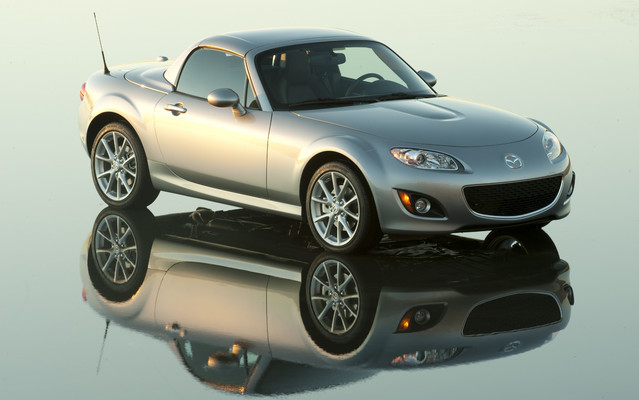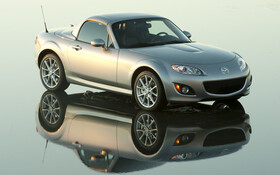Inner Child or Mid-Life Crisis? The New 2009 Mazda MX-5

| Strong points |
|
|---|---|
| Weak points |
|
They say that technology is advancing at an exponential rate. For every new technological discovery the human race makes pushes the boundaries even further, allowing scientists and other men and women in white coats to push the boundary even further. As such, many of the entertaining myths and mysteries of the world have been unravelled, leaving little room for whimsy in youngsters’ minds. But while Amelia Earhart and the Bermuda Triangle may not be subjects of interest any more, why manufacturers insist on trading perfectly good names for alphabet soups is still a complete unknown.
Take this car, for example. Once known as the Miata, the name summed up the car perfectly: fun, easy to use, and small. But apparently that wasn’t good enough, and Mazda felt obliged to take a furrowed-brow approach to the Miata’s badge, seriousing things up substantial with the thoroughly Germanic MX-5. Concurrently, the once-diminutive and simplistic roadster grew in stature, aged in disposition, and became a hell of a lot more complex. So, is this a mid-life ‘mobile in touch with its inner child, or is it just old?
- Also: 2009 Mazda MX-5 Miata: Twenty years young and still looking good
- Also: 2009 Mazda MX-5, always the fun-to-drive roadster
Well, given my facelifted example from Vancouver’s press fleet was coated in a startling shade of what Mazda calls Competition Yellow. Of course, seen in the glorious west coast sunshine, it might be more appropriate to refer to it as Retina Searing Yellow, but that’s neither here nor there. After a quick walk around, the changes for the 2009 model year are easily apparent, even through the pair of polarized lenses required by the gleaming yellow paint. Gone is the homogenized front fascia and it’s oddly shaped headlights and too-small grille, replaced by a far more entertaining face. And I do mean face. With a huge grin and headlights that are best defined as “smiley,” Mazda has imbued the MX-5 with some serious character. Sitting alongside a 2008 model in a grocery store parking lot, the 2009’s friendly face makes the outgoing model look downright surprised; something of an irony given the outgoing fascia’s demise.
Underneath, the changes continue with minor tweaks throughout. The 2.0L motor has had it’s redline bumped up another 500 rpm to help drivers wring more out of the engine. Now sitting at a much more sports-car appropriate 7200 rpm, those additional revs are augmented by a significantly better exhaust system. When the new MX-5 fist appeared, the biggest knock against its new engine was the flat, uninspired exhaust note emanating from the dual exhaust. Now, this MX-5 sounds properly sporty; with a thrashing mechanical cacophony from beneath the hood that is accompanied by a low baritone from the intake at low rpms that grows to a howl at higher engine speeds. Interestingly, Mazda’s previous difficulty with the engine note was the result of a relocated cold-air intake (the first and second generation Miata’s drew air from behind the radiator, the new cars pull it from behind the nose). However, if you want this new, sexy sound, you’ll have to opt for the six speed manual gearbox, because it’s the only one that sounds any different thanks to an Induction Sound Enhancer (ISE). Made up of a series of tuned pipes and a passive resonance membrane, the ISE delivers the engine's natural induction sound to the cowl, just ahead of the windshield, so pleasing engine sounds can be delivered at a comfortable volume without resorting to simply being loud. Of course, you’d be crazy not to get the six speed anyway, since a new carbon coating on the first four gears make for even smoother changes, while a longer sixth gives you better fuel economy on the highway.
And when it comes to the suspension, this new Miata has traded its suspenders in for some fashionably fitted stuff. Relocated outer ball joints move the roll center downward, and better dampers provide a much better ride on both standard and Bilstein equipped models. This translates into quite a bit more grip than the outgoing car possessed, especially over broken pavement. Under the most aggressive cornering attitudes, the MX-5 takes a thoroughly serious stance to cornering attitude, no longer feeling like its being flung through a corner. Instead, the front end turns in and the rear follows as if on rails. Give the little roadster a footload of gusto at the right time, and the reduction in body roll makes one of the most controllable cars on the market even more communicative.
Of course, when you’re planted firmly in a re-sculpted seat that hangs just inches above the ground, it’s pretty easy to feel any sudden increases in the stern’s yaw rate. And those wayward motions of the bright yellow booty were downright commonplace thanks to the updated traction and stability control software that allows the driver to overstep the bounds of traction before cutting in to save the day.
And that pretty much sums up the new MX-5. Although each individual change may be quite minor, they add up to a significantly more potent automobile. To be honest, I considered the introduction of the new MX-5 a complete failure when it debuted in 2006. Too big, too serious, and too complicated, I felt the 2005 Mazdaspeed MX-5 was easily the better Miata, and many critics agreed. Although quantitatively superior to the previous model in every way, the 2006 model lacked the fun quotient of the Miatas that preceded it. And although the changes since then (like the introduction of the power hardtop model in 2007) may have widened the MX-5’s fan base, Mazda hadn’t addressed the mystery of the missing fun. And this year, it’s not the additional revs under the hood, or the new fancy-shmancy carbon coating in the transmission that makes this the most Miata-esque of the MX-5s. Sure, those improvements make the vehicle faster and more capable than the 2008 model, but it’s the qualitative changes that bring its inner child boiling to the searing yellow surface. The more melodious sound, the more supportive seats, and the increased leeway granted by the electronic nannies makes this friendlier looking MX-5 vastly more fun to drive, fast or slow. And that’s precisely what made the old Miata fun to drive in the first place.











